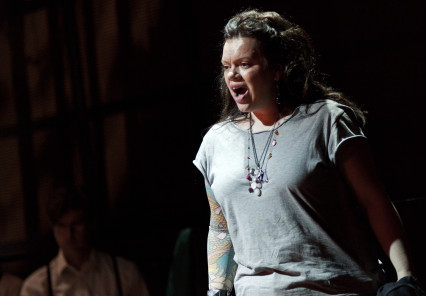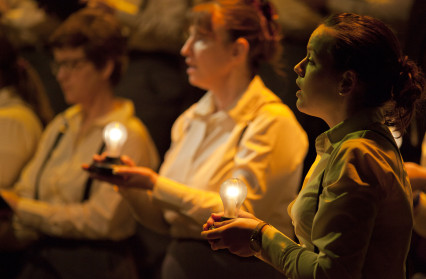Theatr y Ffwrnes, Llanelli, April 18 2015
Music by Pwyll ap Siôn
Words by Menna Elfyn
Music Director: Jenny Pearson
Director: Angharad Lee
Repetiteur: Annette Bryn Parri & Llŷr Simon
Designer: Becky Davies
Assistant Designer: Jess Scott
Lighting Designer: Ace McCarron
Choreographer: Phil Williams
WNO Producer: Ruth Evans
Sian Meinir / Dyfed Wyn Evans / Semi Chorus / Gair ar Gnawd Community Chorus/ Ensemble of WNO Orchestra soloists and others
Originally staged at Y Galeri, Caernarfon in March 2012, Welsh National Opera’s Gair ar Gnawd (‘Word on Flesh’) was revitalised and expanded for a single performance (preceded by a school’s matinee) in Theatr y Ffwrnes, Llanelli. A chance for the company to engage creatively with the Welsh language, the opera follows the story of Awen and Anwar, an unlikely pair who come together to oppose the conversion of a chapel, where they both work, into a casino. Awen puts words on flesh as a tattoo artist, Anwar is a translator of the Bible, and argues that the word of God within the pages made flesh to begin with. Themes such as modernisation, religion, hope and compromise are packed into this 75-minute performance, which makes the production almost like a musical; indeed, librettist Menna Elfyn and composer Pwyll ap Siôn confessed in the pre-show discussion that they were initially hesitant at calling it an opera.
The set was particularly impressive. Awen’s tattoo parlour is packed with decorated mannequins and colour whilst Anwar’s office is littered with books and manuscripts. The pair are surprised to discover each other next door and thus their difference in beliefs and attitudes become apparent. Anwar sings of his pre-Christian existence, before his religious re-awakening, and a desire to translate the Bible into all the little languages of the world. Awen’s pagan beliefs cause her to scoff at Anwar’s preaching as she argues that words on flesh are better than words in books. The pair are perfectly cast. Sian Meinir is wonderfully extravagant as the self-confident Awen, whilst Dyfed Wyn Evans is equally as skilled as the reserved yet passionate Anwar.

Originally, Menna Elfyn was keen to tell the story of William Morgan, the translator responsible for the first Welsh Bible. Although ultimately this idea became over-shadowed by the more modern tale of translating the Bible into minority languages online, Morgan’s name did crop up and felt a little crow-barred into the narrative at times. Of course Anwar would find Morgan an inspiration as a translator himself, however the parallels became somewhat tenuous and perhaps it was a stretch to ask audience members to recognise him as a significant figure within the context of the piece.
The story itself, although interesting and relevant, lacked any serious conflict. Ultimately, the threat of a heartless casino destroying their world brings Awen and Anwar together, the locals aren’t too pleased, the business venture fails and so the status quo is restored. The semi-chorus give a fantastic ensemble performance as the malign agents of change; developers, bankers and greedy businessmen. Bankers sing of money, pouring coins out of containers like water. Emyr Wyn Jones gave a particularly strong performance as the ruthless site developer, his dominant physical stature reaffirmed the power and underlying danger of the character. The community chorus provided a strong support from behind the curtains, becoming symbols of community spirit for Awen and Anwar when they feel as if all hope may be lost. The use of saxophone and percussion in the ensemble gave the score a modern twist.
Pwyll ap Siôn’s music is satisfyingly bleak and sinister, with some lively and ominous numbers to pick up the pace. These are also succinct and not over-indulgent, which complements the narrative perfectly. The numbers are sung bilingually, with the community chorus mainly singing in English, whilst the semi-chorus flow effortlessly from one language to another, reflecting the true bilingual nature of Wales. There are numbers also sung in Maltese and Hindi to represent the minority languages into which Anwar translates. Angharad Lee’s direction is simple yet effective, with Becky Davies’ set providing levels for a straightforward interpretation of hierarchy and the balance of power. The Welsh passages of Menna Elfyn’s expertly crafted libretto are sharp and subtly poetic.
The piece is a modern community opera which, although impressive in terms of its score and libretto, would have perhaps benefitted from greater conflict and peril within the narrative. There may be common misconceptions about opera as an art form, but this production certainly challenges these prejudices.
Gair ar Gnawd will be broadcast on S4C next Saturday following a documentary programme (broadcast Wednesday) about its production.
Photographs of Community Chorus and Sian Meinir by Jeni Clegg











